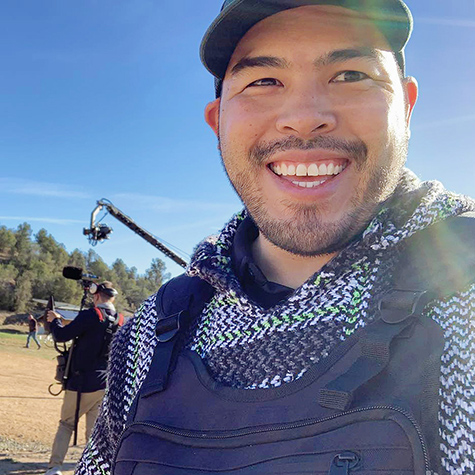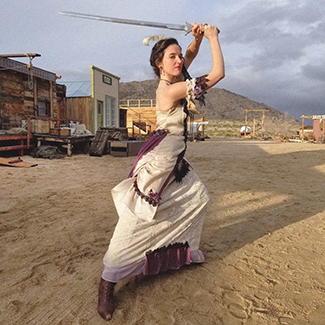How to prepare so you look like a rockstar and not a rock (like I did)
When I got on my first real set in LA, it was Scorpion Spring, a feature film shot in the Anza Borrego desert, about three hours south of LA.
It was a film with Matthew McConaughey and Alfred Molina. They were newbie actors, just getting started with their careers and I was too.
They put everyone up in a motel inside the national park. Every day we’d have a 6 am call time, leave our rooms, prepare the gear, and get ready to shoot by 7 am.
One day, the Director picked a spine from a cactus and cleaned his teeth with it.
The next day he had to go to the hospital because the poison from the spine made his mouth swell up like a balloon so he couldn’t even talk.
He was a really nice person. I felt really bad for him. We all make mistakes.
First thing: Being prepared to work on set is really important.
On this feature film, I was not prepared at all. My shoes had no support. After about five hours of standing on the sand, my shoes were filled with sand and my feet were killing me.
I wanted to sit down, but there was no place to sit down.
I also did not have sunscreen or a hat or a good jacket to protect me from the cold and wind. So I was very uncomfortable in the early mornings when it was cold, and I was freezing at night.
During the day I was hot and getting sunburned. All I wanted to do was go back to the room and sleep.
All I could think about was my discomfort. I didn’t even care about watching what was going on on set.
I wasn’t watching how they were lighting the set, how the camera set up for the shots, or how many takes we were doing and why.
So I missed a lot.
On top of that, since I wasn’t asking many questions, they weren’t teaching me anything.
And I also wasn’t doing much, so no one put me on their lists to call me again for work.
Today, I’m on set all the time and I often hear, “You’ve got to have a certain type of personality to make it in the film industry.”
Yes and you can learn that personality. I didn’t “get it” early on either.
The thing is if you burn through your opportunities before you “get it” that is not good.
The wild thing is I wanted to work in film. It was all I wanted to do. I was in love with the idea of it.
But the actual reality of a film set, I didn’t understand so I wasn’t ready for it… until I was. And then I learned some things and it was like I woke up.
Now I see and appreciate the way the set works, the social aspect of it, and what we are paid to do… this very unique way of making a living.
I went through a lot of painful situations, especially my first few years getting used to film sets, and that’s why I love to tell people what I know, to help you avoid some of the mistakes that are so easy to make because you don’t know any better.
Of course, there’s mistakes like oops I should have known better then there are mistakes that are coming from the way you’re thinking. Those were my mistakes.
Those are the hardest ones to see and they’re also the mistakes that cause people to be unsuccessful in the film industry.
Just like me, you can also learn so it’s never too late. Here are some of the most essential things I teach my students.
The first thing is to have good shoes with great support because you may be standing for 12 hours.
Yes, you can sit down, and make sure you get off your feet at lunch. If it seems OK to find a chair to sit on, then great. You probably would not sit on the ground because you’re too low and you need to be looking like you are ready to help out.
The next thing is to have all of the clothes that you need for extreme weather. You are not used to being outside for 12 hours a day, most likely. Have rain gear, waterproof boots, as well as everything for standing around in the sun for 12 hours. Have clothes for cold mornings and evenings when you’re setting up and wrapping in the dark.
You’ll need long underwear, mittens with the fingers cut off, and work gloves to carry gear or wrap dirty cables without getting your hands all dirty.
One of my best tricks that I tell everybody is to have leg warmers.
I love leg warmers because you can pop them on even over your pants and your long underwear and your legs are cozy!
After a few days of driving home after a long 12 hour day and having cold legs, I said, “Never again.” So now I wear leg warmers. Lots of people on film sets are now wearing leg warmers because of me.
On one of my shoots last month, the director (who was from France) had commented on my leg warmers and saying that was such a good idea.
So at the end of the shoot, I gifted him my extra pair of leg warmers to bring back to his pregnant wife. I put them in a fancy, red bag with tissue paper. He was so surprised and happy!
I digress.
Back to being prepared. It will be helpful to have a fanny pack that you can wear around your waist or on your chest. Get a sharpie pen, a leatherman, a roll of white gaffer tape, and a roll of yellow or pink camera tape.
You never know when you’ll be asked to throw a mark down on the floor for the actor.
In your city, there are film supply places around that sell everything you need. Go there but don’t spend too much money! You’ll see so many cool film things in those stores and will want it all. Just hold off buying a lot of stuff when you’re starting. Get most of your stuff after you talk to people on set and get only what you need.
That being said, here are some definite things to have from day one.
- It’s important to have a flashlight for those early mornings and when you’re wrapping a set in the dark. A headlamp is a very good idea so that your hands are free. Having extra batteries can save the day for locations or art, camera department. AA batteries are often used.
- Having a little notebook with you so that you can take notes on what you are seeing while we are shooting. You’ll have questions to ask later. You can also write down the terms you hear on set so you remember and practice the language of the set.
-
You’ll need your cell phone and a charger, maybe an extra battery for your phone. Film work will come in through text or emails, so you will want to always have your phone fully charged and check it often.
You might be going on runs, going to Starbucks, and then the prop house, to the airport, and you’ll need a phone that is fully charged so people can get ahold of you.
- When you’re on set, you don’t want to be hunting around trying to get a charge on your phone when you are working. You want to be focusing on helping that set run smoothly.
When you are not prepared, then you get distracted trying to fix your own problems, and you don’t make a good impression and may not be asked back.
I try to prepare as much as I can so everything has been done by the time I arrive on set. ike my cell is charged, I have a full tank of gas, my van is cleaned out. I’m ready to go, I got the script printed out, I have the call sheet ready. So I don’t have to seek out these things to get ready. I’m already coming in as ready as I can be.
- You should print out the call sheet so that you have everybody’s names and everybody’s positions at your fingertips. You may also want to take a screenshot of it and have it in your phone.
- Try to learn everyone’s names. That is a very good idea. But don’t repeat their names a million times.
- Don’t be checking social media or scrolling Instagram when you’re on set working. The producer is paying you to help out on set, not check IG. Keep your attention to what is happening on set and watching for how you can help. If you are constantly looking for how you can help on that set, you will definitely get hired again.
- Arrive 30 minutes early to set. It forms a very good impression when you are 30 minutes early. In fact, if you are there before even the production supervisor and coordinator arrives, that’s great! You will look very committed. They will ask you to start helping them immediately, which is exactly what you want. You want a lot of interaction with people so that you can start forming those relationships.
The next chapter is super important: How to feel confident on film sets.
It’s coming tomorrow! Do you like these free chapters? Let me know what you think.
If you have any questions that have come up from reading these documents and being on set, email me and I’ll tell ya what I think. My email is janet@friendsinfilm.com
Talk to you soon,
Janet Urban


